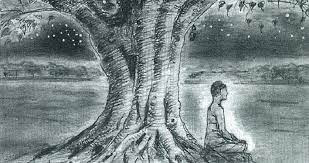Mahayana.
Mahayana Buddhism [大乗仏教] ( Daijō-bukkyō): Buddhism of the Great Vehicle. The Sanskrit mahā means great, and yāna, vehicle. One of the two major divisions of the Buddhist teachings, Mahayana and Hinayana. Mahayana emphasizes altruistic practice—called the bodhisattva practice—as a means to attain enlightenment for oneself and help others attain it as well. In contrast, Hinayana Buddhism (Buddhism of the Lesser Vehicle, hīna meaning lower or lesser), as viewed by Mahayanists, aims primarily at personal awakening, or attaining the state of arhat through personal discipline and practice. After Shakyamuni’s death, the Buddhist Order experienced several schisms, and eventually eighteen or twenty schools formed, each of which developed its own doctrinal interpretation of the sutras.
As time passed, the monks of these schools tended toward monastic lifestyles that were increasingly reclusive, devoting themselves to the practice of precepts and the writing of doctrinal exegeses. This tendency was criticized by those who felt the monks were too conservative, rigid, and elitist, believing they had lost the Buddha’s original spirit of working among the people for their salvation. Around the end of the first century b.c.e. and the beginning of the first century c.e., a new Buddhist movement arose. Its adherents called it Mahayana, indicating a teaching that can serve as a vehicle to carry a great number of people to a level of enlightenment equal to that of the Buddha. They criticized the older conservative schools for seeking only personal enlightenment, derisively calling them Hinayana (Lesser Vehicle) indicating a teaching capable of carrying only a select few to the lesser objective of arhat. According to one opinion, the Mahayana movement may have originated with the popular practice of stupa worship—revering the relics of the Buddha—that spread throughout India during the reign of King Ashoka. In any event, it seems to have arisen at least in part as a popular reform movement involving laypersons as well as clergy.
Leeds England, an Educational Film from the 1970's.
Here at Kosen-Rufu.com we follow some of the last words the original Buddha left us, and this is to educated ourselves, learn all we can. F...

-
Kōsen-rufu (広宣流布), a phrase found in the Japanese translation of the Buddhist scripture Lotus Sutra , is informally defined to as "wor...
-
A Bodhisattva (菩薩) is one who aspires to enlightenment, or Buddhahood. Bodhi means enlightenment, and sattva, a living being. In Hinaya...

